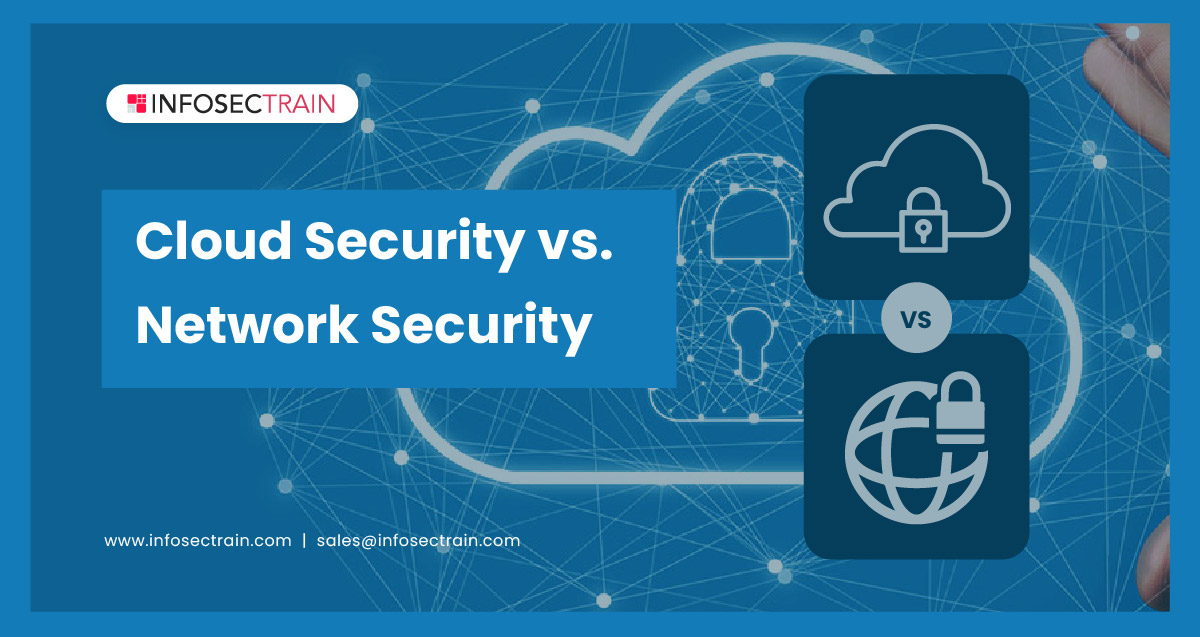Cloud Security vs. Network Security
In today’s digital world, threat elements are becoming more effective in gaining unauthorized access through compromising systems and networks, with the growing reliance on technology. Cybercriminals constantly use potential threats to impair networks and the cloud. Every business needs cloud security and network security to protect itself from threats like cyberattacks, network breaches, and data theft. Both cloud security and network security play an essential part in keeping an organization safe; both have their roles and features for providing a secure environment and constantly monitoring security risks in the digital world. Cloud security safeguards cloud-based networks, apps, and more, whereas network security mainly protects networks.

Table of Contents
What is Cloud Security?
Advantages of Cloud Security
What is Network Security?
Advantages of Network Security
Difference Between Cloud Security and Network Security
In this article, you will understand what cloud security and network security are, their benefits, and the difference between standard cloud security and network security.
What is Cloud Security?
The term cloud security is also known as cloud computing security. Cloud security protects cloud-based infrastructure from hackers, unauthorized access, DDoS attacks, and other threats using many levels of security procedures and measures. Cloud security is a collection of rules, applications, controls, strategies, and processes that work together to safeguard data and apps stored in the cloud from cyber threats. It protects cloud-based assets such as network services, apps, data, confidential business information, intellectual property, etc.
Advantages of Cloud Security
Increased availability: Cloud security solutions ensure the availability of applications, web assets, and resources. Cloud security solutions offer continuous and real-time assistance.
Effective DDoS defense: Cloud security solution provides the most effective detection, monitoring, and mitigation services for DDoS attacks. You will require content delivery networks with DDoS absorption capabilities and real-time scanning to detect and mitigate DDoS attacks to maintain service continuity.
Data protection: Cloud security solutions ensure data protection by adopting numerous security procedures and rules. Security methodologies and policies prevent unauthorized parties from accessing confidential and sensitive information, including substantial access restrictions, intrusion prevention, identity management, and data encryption.
24×7 visibility: The leading cloud security solutions enable 24×7 cloud visibility of all operations, including applications, programs, and cloud-based assets. This helps businesses keep a constant eye on their security threats and repercussions.
Pay as you go model: The entire cloud technology follows a pay-as-you-go model and cloud security is available in the same. The cloud security model ensures you only pay for what you use.
What is Network Security?
Network security is a set of rules that protects the confidentiality, integrity, and availability of computer networks and data by integrating software and hardware technologies. Network security is an essential security mechanism for safeguarding our systems against ever-increasing cyber threats. The goal of network security is to protect assigned digital assets such as computer systems, information, data, and servers from unauthorized access, misuse, malfunction, unwanted modification, incursions, and other threats in the networking system. It secures network traffic and infrastructure against threats such as Trojan horses and malware.
Advantages of Network Security
Protects confidential data: A network contains lots of confidential data. Network security ensures that sensitive data and personal information shared across the web are protected from unwanted access.
Risk mitigation: The network security solution will keep your company compliant with regulatory requirements and also reduce the economic and business consequences of a breach.
Protects against cyber-attacks: The majority of cyberattacks originate through the internet. Network security can prevent cyber threats and other malware or virus-related attacks.
Access levels: Different users have different access permissions to keep the network secure and ensure that only licensed software is used. The authorization procedures verify the user’s identity to see if they have permission to access specific resources.
Updates centralized: Keep the anti-virus software up to date regularly. It is critical for security against attackers because older versions may not provide adequate protection. A centralized network security solution delivers the benefit of timely upgrades, with or without individual awareness.
Difference Between Cloud Security and Network Security
| Cloud Security | Network Security |
| It is a subset of network security. | It is a subset of cyber security. |
| It provides centralized cloud-based security solutions with a strong emphasis on software. | It comprises both hardware and software-based security systems. |
| Infrastructure investment is minimal. It reduces the cost parameter significantly. | Infrastructure costs are very high. |
| It protects target systems from illegal data access, DDoS attacks, and viruses. | It guards against unauthorized access, malfunctions, and modifications, among other things. It is concerned with DDoS protection. |
| It uses cryptography, machine learning, analytics, and other techniques to identify security threats. | It detects security threats by installing firewalls, maintaining network visibility, and conducting penetration testing. |
| It protects the company’s cloud-based network services, apps, containers, and other assets from cyber threats. | It focuses on protecting the networks of organizations from cyber attacks. |
| It protects data on the platform by working with web apps, firewalls, encryption, identity access, and management products. | It has numerous layers of security checks at every step with its protection and policy control. |
| It has greater scalability. | It has lower scalability. |
Cloud Security and Network Security with InfosecTrain
In the area of Cybersecurity, cloud security and network security are both high-demand domains, but they play different roles in keeping a company safe. You can take various courses in these domains based on your technical abilities, interests, and long-term and short-term career goals. You can enroll at InfosecTrain if you want to train yourself in the cloud security or network security domains. Both of these are in high demand in today’s digital environment, and you will be successful regardless of whatever path you take. Visit InfosecTrain’s cloud security and network security online training courses to learn more and get a better understanding.






 1800-843-7890 (India)
1800-843-7890 (India)